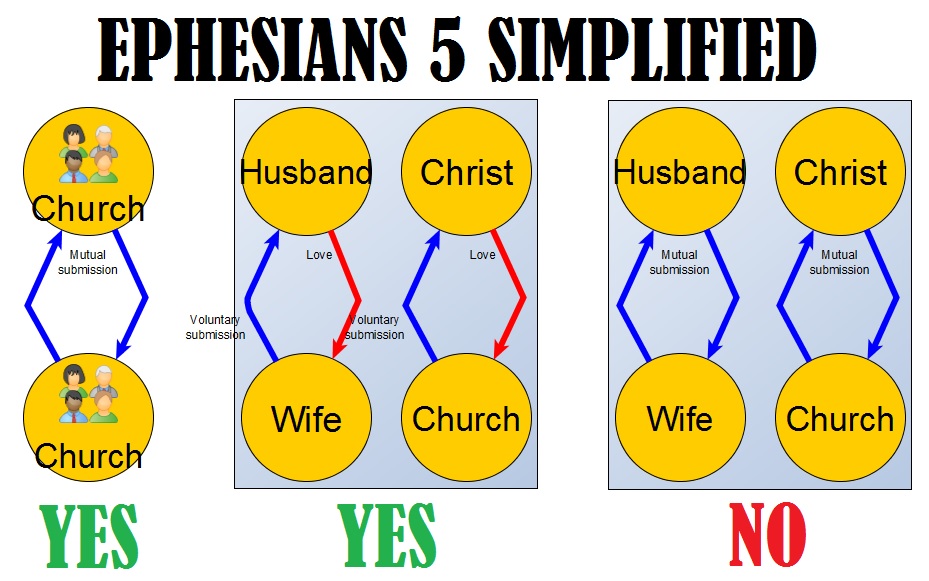Part One
Wives, submit to your own husbands, as to the Lord. For the husband is the head of the wife even as Christ is the head of the church, His body, and is himself its Savior. (Eph 5:22-23 ESV)
The predominant opinion of popular cultural in America today is that marriage is–or ought to be–an equal exchange between husband and wife, that the two should work together in mutual and equal submission for the greater good of the partnership and the family. But this ideal seems to go against the plain meaning of Paul’s instructions to the Ephesians as quoted above. Was Paul wrong? Or have we misunderstood his intent? Since Paul was a Hebrew writing in Greek, and we are Americans (or Australians, Canadians, Brits, etc.) reading an English translation of his ancient Greek text, the idea that something might have gotten lost in translation cannot be ignored.
There are three main arguments I have heard in favor of an equalitarian interpretation of this passage. I will refer to them as Mutual Submission, Source vs Authority, and The Fall.
- Mutual Submission.
- Source vs Authority.
- The Fall.
I’ll consider the first two arguments in this post and the third argument next time.
Mutual Submission
The argument: The submission of wife to husband in Ephesians 5:22 is merely a reiteration of the instructions in the immediately preceding verse for all believers to submit to one another.
It seems to me that the Mutual Submission theory depends on the assumption that women are predisposed against mutual submission to their husbands. Not to other believers, just to their husbands. Why else would Paul devote one verse (21) to the mutual submission of all believers, but twelve (22-33) to the submission of wives to their husbands within the overall context of mutual submission? I don’t disagree with that premise at all. In fact, it is almost self-evident that most women have trouble submitting to their husbands, especially if those husbands are already submitted to them. I’ll explain what I mean by that in more detail when I discuss the consistency of Biblical expression on patriarchy within the family later. For now, I believe it will suffice to point out that this logical dependency on the unsubmissive nature of women within marriage is also the fatal flaw in the Mutual Submission argument. If women are by nature less able or willing to submit to their husbands, then it is only to their own benefit for women to expend extra effort on that submission and for their husbands to encourage them in it, and there is very little difference between “wives submit to your husbands” and “wives, make extra effort to submit to your husbands as opposed to everyone else, because that is especially difficult for you.”
Source vs Authority
The argument: The Greek word for “head” in verse 23 (kephale) was used in the sense of the head of a river, i.e. the source, rather than in the sense of a controlling authority.
Understand that I am not an expert in ancient Greek or Koine Greek—I’m not even a novice—so I must defer to the actual experts.
Wayne Grudem of the Trinity Evangelical Divinity School wrote,
Those who claim that κεφαλή could mean “source” at the time of the New Testament should be aware that the claim has so far been supported by not one clear instance in all of Greek literature, and it is therefore a claim made without any real factual support. The editors of the standard lexicons for New Testament Greek (such as Bauer-Arndt-Gingrich-Danker) have been correct not to include “source” among their lists of possible meanings for [kephale].
In fact, all the standard lexicons and dictionaries for New Testament Greek do list the meaning “authority over” for κεφαλή, “head.” Bauer-Arndt-Gingrich-Danker give under the word κεφαλή the following definition: “In the case of living beings, to denote superior rank.” They list thirteen examples of such usage. 1
Thayer’s Greek Definitions says:
1) the head, both of men and often of animals. Since the loss of the head destroys life, this word is used in the phrases relating to capital and extreme punishment.
2) metaphorically anything supreme, chief, prominent
2a) of persons, master lord: of a husband in relation to his wife
2b) of Christ: the Lord of the husband and of the Church
2c) of things: the corner stone
I won’t abuse your patience by quoting the hundreds (thousands?) of Christian theologians and Greek scholars who, for the past 2000 years, have almost universally interpreted “head” in this passage to mean “authority over.” I don’t think it’s at all controversial to assert such a continuity of thought. The argument isn’t whether or not submission of wives to husbands has been taught throughout most of historic Christendom, but whether or not this throng of learned men and women were and are wrong in that teaching. I’m not opposed to the idea that nearly every great thinker for two thousand years could be wrong. I believe they have been wrong on some significant issues. However, I would not discard their opinions without strongly compelling reasons. I’ve read a few articles that take the opposite view, and I haven’t been very impressed, either with their scholarship or their logic. Maybe I just haven’t read the right ones, and as I already said, I’m no Greek scholar myself, so whether or not I am impressed is hardly relevant.
Fortunately I don’t think the precise meaning of κεφαλή is relevant either. However the word is translated, the context makes Paul’s intent imminently clear. Let’s break down Paul’s individual statements beginning in Ephesians 5:22:
v22 – “Wives, submit to your own husbands, as to the Lord.” How should a wife submit to her husband? In the same manner she should submit to the Lord. Jesus washed His disciples’ feet and said the one who would lead must serve, and the first will be last. But He also said, “If you love me, keep my commandments.” In other words, “Obey me.” Although Christ serves us of His own free will and in the manner of His and His father’s choosing even to the point of giving up His life for us, Christ does not obey us. To the contrary, He is our King. We owe all obedience to Him, while He owes no obedience whatsoever to us.
v23 – “For the husband is the head of the wife even as Christ is the head of the church, His body, and is himself its Savior.” There are two important ideas here that need to be addressed: First, the husband is to the wife as Christ is to the Church. This is a rephrasing of the previous verse. If the church owes submission to Christ, so does the wife owe submission to her husband. Second, the term “head” is explicitly, if metaphorically, used in the sense of the physical head of a person’s body, and not the source of anything. Even if the ancient Greeks didn’t understand the cellular mechanisms of the brain and the nervous system (who does?), they were fully cognizant of the fact that the head houses the command center of the body. There can be very little doubt that when Paul wrote that Christ is the head of His own body, he meant that Christ is the controlling authority of His body.
v24 – “Now as the church submits to Christ, so also wives should submit in everything to their husbands.” Again, Paul expresses the same idea as in the previous two verses, only rephrased. Since Christ’s body is submissive and obedient to Christ, so should the wife be submissive and obedient to her husband. The Church’s submission to Christ is not mutual. Christ does not submit Himself to the Church in any manner other than in choosing to serve her for His own purposes. He sacrificed Himself for the Church in submission to His Father, not in submission to the Church.
I could continue through the rest of the chapter, but I’m sure you get the idea. (And again, I don’t want to waste your time. You’re here, and I’m grateful.) Paul keeps saying the same thing in different ways: “Wives submit to your husbands as to the Lord.” I’m not saying that the Greek word kephale cannot possibly be translated “source” anywhere in this passage, although I think that would be awkward and implausible. I’m saying that it is much more natural and consistent to render it just as the vast majority of Bible translators have done: “head,” as in the hard, roundish object at the end of your neck. I’m also saying that it cannot be understood to imply anything but an authority relationship of husband over wife, even if it is translated as “source” instead of “head.”
- Christ is the source, founder, and head of the Church, and He is the ultimate authority over her.
- The Church submits to Christ in all things, without expecting or having any right to His submission in return.
- Christ serves the Church even to the point of giving up His life for her, but He never serves her in a submissive role. He is, was, and always shall be the King of Kings, Lord, Master, and Law-Giver of the Church.
Please don’t misunderstand me to be saying that wives should submit to their husbands in exactly the same way that the Church should submit to Christ. Jesus is perfect; husbands are not. Jesus would never expect the Church to do something that clearly violates God’s Law. Some men routinely expect their wives to sin against God on their behalf. No woman owes her husband more allegiance than she owes to God, and His Law trumps any command of men. With that caveat in mind, Paul still wrote, “Wives, submit to your husbands as to the Lord.”
There is no way to interpret this passage in an equalitarian manner without doing severe injustice to the clear meaning of the text, not to mention the rest of Scripture. The clearly patriarchal, non-equalitarian nature of Paul’s instructions to wives does not depend on the translation of the term κεφαλή, nor are they merely a subset of the mutual submission owed by all believers to all other believers. The submission of wives to their husbands is of a different nature altogether, and this nature is illuminated throughout all of the Scriptures from Genesis to Revelation.
Next time, I will address the third equalitarian argument, The Fall, and show how Paul was not saying anything revolutionary nor acquiescing to cultural expectations. His words were solidly based in the Garden of Eden and reinforced by God’s law, the Prophets, and the Apostles.
(On to part two!)

1. Wayne Grudem, “Does κεφαλή (“Head”) Mean “Source” Or “Authority Over” in Greek Literature? A Survey of 2,336 Examples,” pp 46-47, Trinity Journal ns 6.1 (Spring 1985): 38-59. http://www.biblicalstudies.org.uk/pdf/tj/kephale_grudem.pdf Last accessed 9/14/2014.
P.S. Don’t forget to subscribe for updates, anniversaries from American history, and links to interesting, enlightening, and useful stuff from around the Internet.


